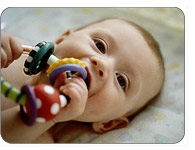Teething: Taking Care of Your Baby's Budding Teeth
Around six months of age, you'll notice your baby will start teething. Teething symptoms to watch for include irritability, drooling, finger sucking and red cheeks. Of course, once your baby's first bud pops out, you'll figure out what was behind all that drooling and crying. You now need to provide special care to your baby's first set of teeth.
How Do I Prepare for Baby Teething?
It's a good idea to prelude your child's teething with 'practice brushing'. This means taking a soft washcloth or gauze and gently wiping your infant's gums daily. Put the washcloth or gauze around your index finger and softly wipe the front and back of gums. This will serve to prepare your child when the teeth come in.
Symptoms of Teething
Signs of teething include drooling; red, swollen and sore gums; pain that leads your baby to bouts of crying and raises their irritability; chewing on objects and frequently putting them in his mouth; loss of appetite; bright, red cheeks; lastly, teething and disrupted sleep often go hand in hand. 
Remember, these are normal symptoms and will disappear as your child grows out of the teething age. However, it is important to comfort your baby's ailments. Do monitor your baby's symptoms closely, as difficult teething needs to be identified in order to soothe your baby's woes quickly; remember, infant teething pain can be traumatic.
Baby Teething Remedies: Providing Comfort
While you're taking care of these new buds, it's a good idea to ascertain whether the teeth are causing discomfort to your child. You'll know when your child's irritable and constantly gnawing random objects that you need to offer her a soft teething ring.
What seems to work best at soothing your baby's ailments? Offering cool objects, such as a frozen banana or frozen washcloth to bite down on helps relieve some suffering (remember to supervise your child when allowing them to bite on a frozen banana as it presents a choking hazard).
Some babies develop a fever with teething; for these infants, try acetaminophen such as children's Tylenol.
Home remedies for teething include offering teething biscuits. A teething biscuit is a hard biscuit that allows your child to work their teeth through. You can buy teething cookies at most grocery stores. Alternately, you can offer stale bagels or put banana bread in the oven for 15 to 20 minutes on 200 degrees. Teething babies love to put objects in their mouths, so nutritious teething biscuits is the perfect way to comfort and feed your infant.
Once Your Baby's Teeth Come In
The first bud has broken free. You can continue to either use the washcloth or gauze or you can even buy a soft nylon baby brush. There's not yet a need to use toothpaste.
Flouride can strengthen and protect the teeth from harmful bacteria, but when do you start using it? Actually, because most municipalities flouridate their water supply, your breast milk has probably been providing baby with a healthy dose of flouride. At about 18 months though, when the back teeth emerge, you can use child toothpaste. Remember to use toothpaste sparingly as children often swallow more than they brush with. Practicing good oral hygiene with your baby will help develop good brushing techniques that carry on to later life.
How To Help Your Child Enjoy Brushings
Some baby's might resent having their mouth invaded by your fingers or toothbrush, so remember to make it fun for them. This starts with how you approach brushing-don't punish your child if she's being fussy, just be patient and caring. You might also buy fun or colorful brushes.
Teething and the Bottle
If your baby's drinking from a bottle, teething can be tricky. You want to stop giving your baby the bottle at night to prevent tooth decay. Because she's been relying on the comfort of sucking her bottle, this could make it hard to stomach the pain of teething. Therefore, try not to get in the habit of having her rely on nighttime bottles.
The First Visit to the Dentist
Most doctors will check the appearance of the teeth during a regular checkup at around six months. It might be a good idea to bring your baby along to the dentist when she is two.
